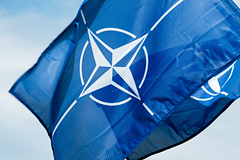FT: Russia's security proposals are impracticable, but NATO will negotiate with the Kremlin

Photo: Shutterstock
Most of Russia's proposals on security guarantees in Europe are impracticable, but NATO still resigned itself to the need to negotiate with the Kremlin. This is stated by the Financial Times with reference to officials in the North Atlantic Alliance.
The publication notes that Western officials privately stated that they reject almost all points of the Russian initiative as implausible, untrustworthy and contrary to the treaties concluded after the end of the Cold War. According to them, Russia's proposals violate the countries' right to sovereign defense policies.
At the same time, NATO officials said about the potential deterioration of the diplomatic situation in case of refusal of the Russian proposals. According to FT, the alliance believes that the Kremlin's initiative on security guarantees can be used in negotiations with Russia on a par with sanctions.
“The problem here is that if we just say no, then we won't have room to talk,” a senior NATO diplomat said. He also noted that the bodies of the alliance are now urgently discussing the composition of the delegation and the position of the unification in the negotiations with the upcoming negotiations with Moscow.
The publication also learned that Western diplomats will not allow Russia to put its conditions on NATO countries, so Brussels, like Washington, will give an answer to Moscow when they formulate counter proposals. It is noted that Russian initiatives are rejected by the defense ministries of the Baltic and Northern European regions.
“It is important that in the dialogue we have with Russia, we remain true to our own principles. And one of them is the indivisibility of the security of all NATO member states, ”said Andrea Sasse, spokeswoman for the German Foreign Ministry.
Earlier, Russian Deputy Foreign Minister Sergei Ryabkov said that Moscow needed an urgent US response to Russian proposals on security guarantees, as the situation could worsen. According to the diplomat, the United States will delay the consideration of the issue and “will try to translate all this into a sluggish process.”

